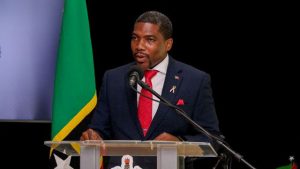 In keeping with the principles of good governance and transparency, the Government of St Kitts and Nevis has authorized the release of the 2018 Article IV International Monetary Fund (IMF) Report. The Executive Board of the IMF therefore released the report on November 21, 2022, outlining the details of the Article IV consultation with St Kitts and Nevis concluded on September 14, 2018.
In keeping with the principles of good governance and transparency, the Government of St Kitts and Nevis has authorized the release of the 2018 Article IV International Monetary Fund (IMF) Report. The Executive Board of the IMF therefore released the report on November 21, 2022, outlining the details of the Article IV consultation with St Kitts and Nevis concluded on September 14, 2018.
The report indicated that the “Directors acknowledged significant challenges, including those associated with declining Citizenship by Investment (CBI) inflows, financial sector vulnerabilities, tighter global financial conditions, and weather-related shocks. Against this background, Directors encouraged policies to safeguard macroeconomic and financial stability, together with reforms to strengthen competitiveness and foster inclusive growth.”
It was noted that “absent any corrective policies, public debt is expected to increase over the medium term, as revenue from CBI receipts further declines.”
According to the IMF, major fiscal adjustment was necessary to reverse the debt dynamics and recommendations were offered to address the issues—
“The adjustment could focus on both revenue and expenditure measures, including streamlining tax incentives, restructuring activities funded by the Sugar Industry Diversification Foundation, and containing the wage bill through a multi-year framework. Recognizing the need to maintain fiscal buffers to assist in covering the cost of natural disasters, Directors recommended the establishment of a Growth and Resilience Fund (GRF), which should be linked to a fiscal responsibility framework. They suggested that access to the GRF could be used to respond to adverse shocks and to support natural disaster resilience investment projects.”
In a recent interview on Freedom FM, the Prime Minister, Hon. Dr Terrance Drew, spoke to our country’s dependency on the CBI programme and the need to chart a different course of action to ensure that our Federation remains strong and viable. The 2018 Article IV IMF Report outlines exactly how that level of dependency affected the economic stability of our nation—
“Growth decelerated marginally in 2017, as the continued decline in CBI inflows slowed growth in construction. Consumer inflation was low, partly due to a small contraction in food prices. The overall fiscal balance remained in surplus but has deteriorated markedly since its 2013-peak, and the debt-to-GDP ratio increased marginally from the previous year. The current account deficit remains high and only marginally declined in 2017, as the decline in CBI receipts was more than offset by growing tourism receipts and a significant decrease in imports.
Foreign reserves at the ECCB remained at comfortable levels, well above the various reserveadequacy metrics. The banking sector has reported capital and liquidity ratios that are well above the regulatory minimum but has elevated NPLs and risks, including delays in completing the debt-land swap arrangement and loss of Corresponding Banking Relationships (CBRs).”
During his recent press conference held on November 15, 2022, the Prime Minister spoke of changes that will be made to the Citizenship By Investment legislation and Unit’s operations to ensure the nation maintains a progressive and sustainable programme whilst cementing our Federation’s place as a leader in the industry. The Prime Minister said—
“Our government has been committed to working tirelessly to strengthen and improve our CBI programme for enhanced sustainability within a framework of Integrity. While we have always been the benchmark of the citizenship by investment value proposition, we understand that in order to remain as one of the most sought-after economic citizenship programmes in the world, we need to evolve. We are not making these important decisions in isolation. We have been in discussion with all the relevant stakeholders in the sector. This includes local developers and international investors. There will be much stronger oversight and leadership in the CBI Unit. Our government is implementing strengthened legislative and administrative structures to ensure that real estate projects funded by the CBI programme are completed. To this end we are seeking trusted investors who see the potential of our nation to put capital behind creative and strong projects that will enhance our offering.”
However, the Prime Minister also highlighted that an Economic Council has been formulated to assess the financial status of our economy and chart the way forward. To date Economic Council has met with representatives from the Ministry of Finance, National Bank, Social Security, Development Bank, the Treasury, and Inland Revenue.
Under Article IV of the IMF’s Articles of Agreement, the IMF holds bilateral discussions with members, usually every year. A staff team visits the country, collects economic and financial information, and discusses with officials the country’s economic developments and policies. On return to headquarters, the staff prepares a report which forms the basis for discussion by the Executive Board. At the conclusion of the discussion, the Managing Director, as Chairman of the Board, summarizes the views of Executive Directors, which is then communicated to the country’s authorities.
The details of the IMF report can be found here: IMF Executive Board Concludes 2018 Article IV Consultation with St Kitts and Nevis (https://www.imf.org/en/News/Articles/2022/11/21/pr22400imf-executive-board-concludes-2018-article-iv-consultation-with-st-kitts-and-nevis )
